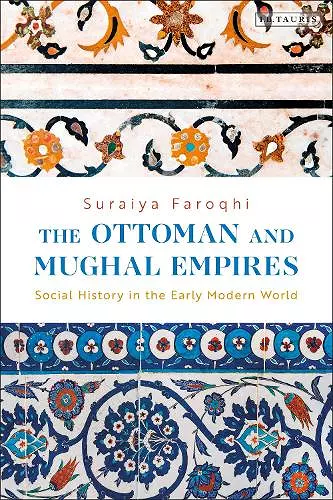The Ottoman and Mughal Empires
Social History in the Early Modern World
Format:Hardback
Publisher:Bloomsbury Publishing PLC
Published:8th Aug '19
Currently unavailable, currently targeted to be due back around 30th January 2026, but could change

A comparative social history between the two great world empires of the Ottomans and the Mughals
For many years, Ottomanist historians have been accustomed to study the Ottoman Empire and/or its constituent regions as entities insulated from the outside world, except when it came to ‘campaigns and conquests’ on the one hand, and ‘incorporation into the European-dominated world economy’ on the other. However, now many scholars have come to accept that the Ottoman Empire was one of the - not very numerous - long-lived ‘world empires’ that have emerged in history. This comparative social history compares the Ottoman to another of the great world empires, that of the Mughals in the Indian subcontinent, exploring source criticism, diversities in the linguistic and religious fields as political problems, and the fates of ordinary subjects including merchants, artisans, women and slaves.
This is a carefully wrought and unexpected combination of detailed social study, global systems analysis, critical historiography, and comparative history. An indispensable read for specialists in the field. Summing Up: Essential. Upper-division undergraduates through faculty. * CHOICE *
An extraordinary work of meticulous scholarship and unreservedly recommended for community, college, and university library collections. * Midwest Book Review *
An authoritative and meticulously researched comparison of the early modern world's two most successful 'Islamic' empires. Scholars have been waiting a long time for a book like this, which is not only the first to bring together Ottoman and Mughal history in a systematic way, but does so with a remarkable attentiveness to the concerns of 'history from below'. In short, this book sets the standard for a new kind of comparative, trans-imperial history of early modern Islamic societies. * Professor Giancarlo Casale, University of Minnesota *
This book presents a valuable head-to-head comparison of the two largest and longest-lasting Sunni Muslim empires in world history, which were also contemporaries and, arguably, “frenemies.” Never content with battles-and-great-men accounts of history, Suraiya Faroqhi offers a top-to-bottom comparison of the full range of features of Ottoman and Mughal society, from court life to crafts to agriculture to slavery, never forgetting that all these elements changed from the sixteenth through the eighteenth century. Her prose is always lively and engaging, and her familiarity with the latest scholarship on both empires is astonishing. * Jane Hathaway, Arts and Sciences Distinguished Professor, Ohio State University, and author of The Chief Eunuch of the Ottoman Empire: From African Slave to Power-Broker *
What new does Faroqhi’s work offer? The answer lies is its focus. Until now, the bulk of the comparative scholarship on these two empires mainly studied the world of the dynasties, statecraft, and aristocracy; in other words, the elite. Faroqhi’s book is the first work that foregrounds the analysis of the lives and social conditions of the subject population instead... And this she has achieved brilliantly. * The Medieval History Journal *
An excellent starting point for those who wish to compare aspects of the socio-economic history of the two empires. * International Review of Social History *
If scholars of the early modern Islamic world were asked for a single adjective to describe Suraiya Faroqhi, most might opt for ‘indefatigable’. * Journal of Islamic Studies *
ISBN: 9781788313667
Dimensions: unknown
Weight: 712g
384 pages